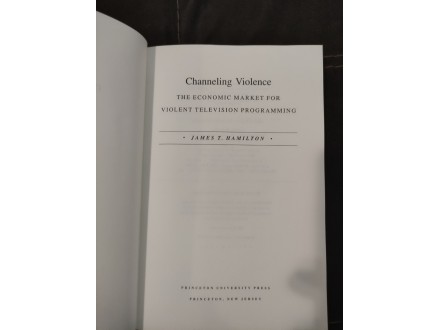Channeling Violence,James T.Hamilton
| Cena: |
| Stanje: | Polovan bez oštećenja |
| Garancija: | Ne |
| Isporuka: | Pošta Post Express Lično preuzimanje |
| Plaćanje: | Tekući račun (pre slanja) Lično |
| Grad: |
Beograd-Voždovac, Beograd-Voždovac |
ISBN: Ostalo
Godina izdanja: 1998
Jezik: Engleski
Autor: Strani
Knjiga je dobro očuvana.
"“If it bleeds, it leads.” The phrase captures television news directors’ famed preference for opening newscasts with the most violent stories they can find. And what is true for news is often true for entertainment programming, where violence is used as a product to attract both viewers and sponsors. In this book, James Hamilton presents the first major theoretical and empirical examination of the market for television violence.
Hamilton approaches television violence in the same way that other economists approach the problem of pollution: that is, as an example of market failure. He argues that television violence, like pollution, generates negative externalities, defined as costs borne by others than those involved in the production activity. Broadcasters seeking to attract viewers may not fully bear the costs to society of their violent programming, if those costs include such factors as increased levels of aggression and crime in society. Hamilton goes on to say that the comparison to pollution remains relevant when considering how to deal with the problem. Approaches devised to control violent programming, such as restricting it to certain times and rating programs according to the violence they contain, have parallels in zoning and education policies designed to protect the environment.
Hamilton examines in detail the microstructure of incentives that operate at every level of television broadcasting, from programming and advertising to viewer behavior, so that remedies can be devised to reduce violent programming without restricting broadcasters’ right to compete.
Awards and Recognition
Winner of the 1999 Goldsmith Book Prize, Joan Shorenstein Center on the Press, Politics, and Public Policy at the JFK School of Government, Harvard University"
Ne šaljem knjige u inostranstvo.
Predmet: 67512085









